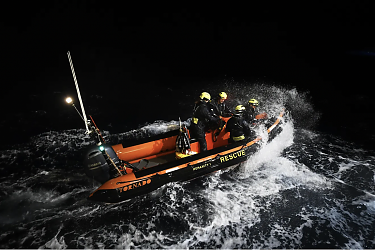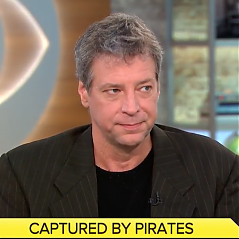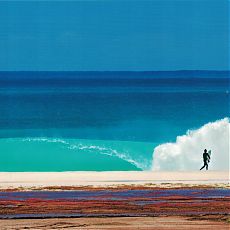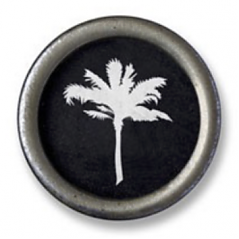Sending in the Marines
Should Western navies raid Somali pirate nests?
November 2009
NATO, officially, is pleased to have pirates to fight. A mission against sea bandits in the Indian Ocean is not mission creep for the trans-Atlantic alliance, if you talk to its leaders, but a return to origins. “It is a good task for the navies of NATO,” Commodore Steve Chick said aboard a frigate last September in the Gulf of Aden. “You only need to look back in history three or four hundred years — this is what some of our navies were formed on, counterpiracy, so it is taking us back to our roots there.”
Referring to U.S. and European history in the fight against pirates, though, is a good way to bring up old antagonisms. The pirate problem 300 years ago looked awfully familiar. Vessels from an Islamic part of Africa (Algiers, Tripoli) patrolled a choke-point in world trade (the Strait of Gibraltar) and grew rich on the ransoms their leaders commanded for sailors. Western countries learned to pay tributes to these pirate states for “protection” in the Mediterranean.
By 1800, some American politicians wanted to raid North African shores and whack the “nests of banditti” instead of paying tributes and ransom.
European governments weren’t so sure. “Over the centuries,” wrote Frederick Leiner in his book The End of Barbary Terror, “there had been many costly [European] expeditions to the North African coast, and after all the bombardments and explosions, the deys, beys, and bashaws were still on their thrones, still taking Christian slaves. Far easier and cheaper, the European thinking seemed to run, to regularize the Islamic maritime nuisance than to eradicate it.”
The first foreign intervention for a fledgling American military after the Revolutionary War was an inconclusive series of raids on Tripoli, starting in 1801. The first big success was a coordinated naval assault on Algiers in 1815. With these early missions the new American republic ended the old romantic era of piracy — which the American colonies, only a few generations before, had avidly participated in. (A U.S. Marine battle in the first series of raids found its way into the Marine Corps Hymn: “From the Halls of Montezuma / To the shores of Tripoli.”)
None of the naval groups in the Indian Ocean — the EU, NATO or an American coalition based in Bahrain — intends to raid the shores of Somalia, in spite of a general acknowledgement that naval patrols won’t be enough. “Even if thousands of ships assembled here, there’s nothing they can do about it,” a former governor of Puntland in Somalia, Adde Muse, told a British documentary filmmaker for the U.K.’s Channel 4 last year. “The only effective way is to wage a land war, to attack their camps and bases on the mainland.”
A Somalia expert at the International Crisis Group, E.J. Hogendoorn, agreed. “The first U.S. foreign intervention was … to tackle the piracy problem that was impacting commerce,” he said. “And to be perfectly honest, there’s a certain point where — you know, why don’t they do it [in Somalia]?”
Hogendoorn wasn’t advocating an attack on Somalia. He was trying to explain national interests. “There’s really no incentive on any one of these actors’ [parts] to aggressively go after this problem,” he went on. “To some degree, the shipping owners are happy to pay ransom because they don’t want deaths on their hands. They’re not really paying it, the insurance company’s paying it — and the insurance company doesn’t mind paying it because they’ll just cover those losses by increasing their premiums. … There’s someone sitting at a desk in England, and they’re doing the math. They can cover these costs. Lloyds [of London] is not going out of business because of piracy.”
The other complication is that Somalia has no single, functioning government. A raid on “pirate nest” towns like Eyl or Haradheere might rearrange Somalia’s pirate business, but not eliminate it. Somalis on the coast nevertheless think a U.S. invasion is imminent. “In Eyl,” says the narrator of the Channel 4 documentary, The Pirates of Somalia, “the locals fear the Americans could bomb at any minute, and kill civilians.”
They won’t. The pirate war isn’t hot enough. In this sense the Western navies are quite aware of their history. One nasty aspect of the old North African pirate trade was that deys and bashaws put their Christian hostages to work as slaves. Somali pirates are kinder and gentler than that: They just want money, and money is one thing the West can provide.
Michael Scott Moore

Rafts of the Medusa
Why every day on the Mediterranean is a new scandal for Europe. For both Foreign Policy and Die Zeit.
California’s Attempt at Land Reparations
How land seized from a Black family 100 years ago may be returned. The Bruce’s Beach story from a hometown angle, for The New Yorker
Day of the Oprichnik, 16 Years Later
The novelist Sorokin, the president Putin, his man Dugin, and the war in Ukraine. For n + 1.

The Rushdie Narrative
Knife and the crumbling ground beneath free speech
There Must Be Some Way Out of Here
An essay on Bob Dylan, “All Along the Watchtower,” and Somali pirate captivity.
That Mystic Shit
The life of Lou Reed in two biographies

Cambodian Seafarers Talk About Pirates
Mike visits Cambodia for The New Yorker to talk about a harrowing shared experience in Somalia
The Muslim Burial
Cambodian hostages remember digging a grave for one of their own. A sequel chapter to The Desert and the Sea
The Real Pirates of the Caribbean
Adventure journalism in Southern California. A travel essay for The Paris Review.

Antifa Dust
An essay on anti-fascism in Europe and the U.S., for the Los Angeles Review of Books
Was Hitler a Man of the Left?
A book that helped Republicans in America lose their damn minds.
Ghosts of Dresden
The Allied firebombing of Dresden in 1945 destroyed the baroque center of what Pfc. Kurt Vonnegut called, in a letter home from Germany, “possibly the world’s most beautiful city.”

George Freeth, Biographed
The first academic treatment of America’s surf pioneer. Also, was Freeth gay?
It’s Called Soccer
Americans live on what amounts to an enormous island, defended on two shores by the sea, and we’ve evolved a few marsupial traditions that nobody else understands.
Tilting at Turbines (in the Severn River)
The morning was clear and cold, with frost on the church steeple and the cemetery grass. I had a quick English breakfast at a white-cloth table, in my wetsuit, and drove to Newnham, a village on the Severn River in Gloucestershire, parking near the White Hart Inn.

The Curse of El Rojo
I’d packed the car lightly — a bag of clothes, a bag of cassette tapes, a backpack of books, a few essential tools.

































